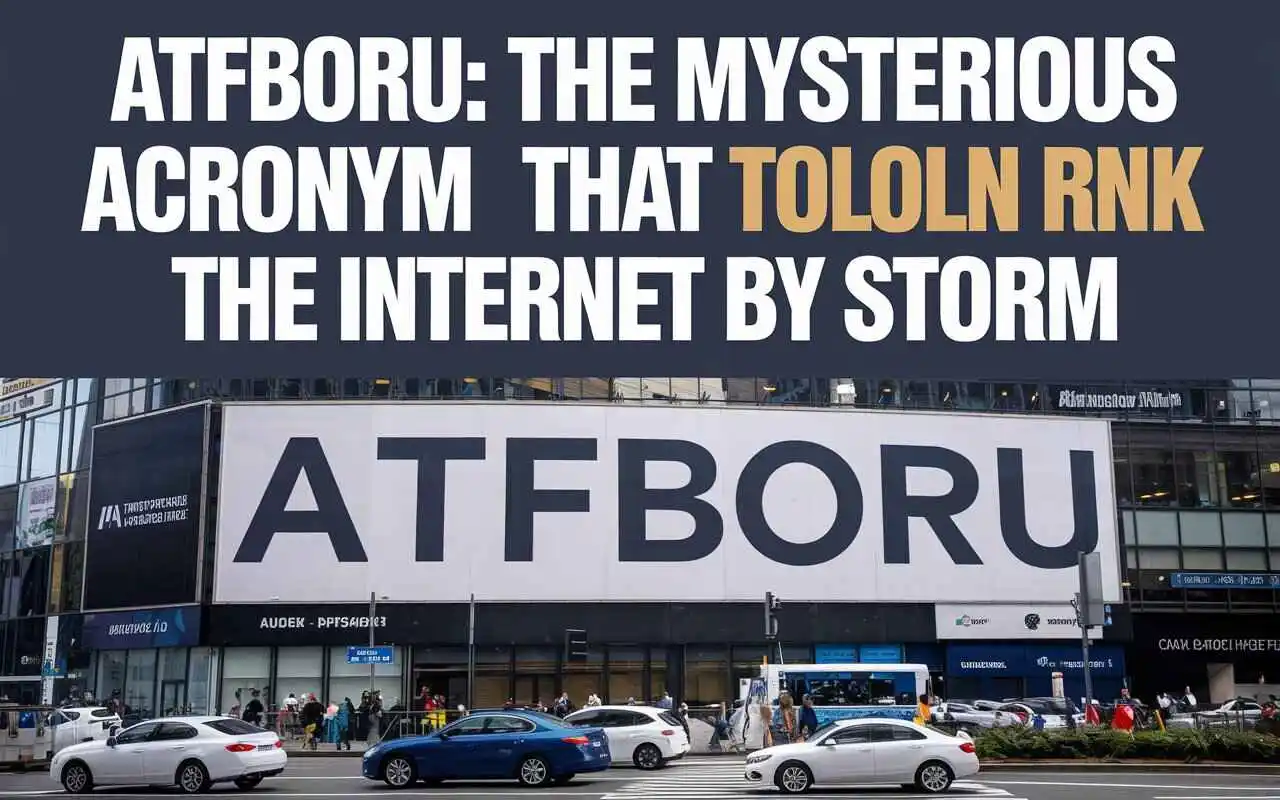The internet thrives on fast-changing trends, and sometimes a new term appears overnight. One such strange and compelling word is atfboru. You may have come across it in tweets, comment sections, or even memes. But what does it mean, and why are people using it? At first glance, atfboru seems like nonsense, but the internet has a way of turning nonsense into sensation. This article explores the meaning, origin, and cultural rise of atfboru across digital communities.
What Does ATFBORU Mean?
ATFBORU is an acronym that stands for “Ask The Fandom But Only Real Users”. It began as a playful phrase used in fan communities. It quickly evolved into a humorous challenge of authenticity. If someone asked a common question, others might reply “atfboru” to imply only true fans should answer. It became a gatekeeping phrase—but also a joke.
The Origins of ATFBORU
The first uses of atfboru can be traced back to fandom boards on Reddit and Tumblr. Users in anime, gaming, and pop culture threads used it to create exclusivity. No one knows who coined it, but the term began appearing in response to new fans. It carried both sarcasm and elitism, often mixed with humor.
Why It Became Popular
Atfboru caught on because it was funny, confusing, and oddly specific. Internet users love inside jokes. Acronyms make them feel like part of an exclusive club. When someone uses atfboru, it shows they’re “in” on the joke. That’s the kind of digital validation people crave. It’s similar to other niche online terms that thrive on confusion.
How ATFBORU Is Used Online
The acronym appears in comment threads, usually after someone asks a basic or common question. Instead of answering, someone might reply “atfboru,” suggesting only real fans or knowledgeable users should reply. It can be playful, but also carries passive-aggressive energy in some circles. People often use it ironically.
ATFBORU in Memes and Humor
Memes helped spread atfboru quickly. It appears in image macros with characters looking smug or sarcastic. The humor lies in its absurdity. Most people don’t even know what it means, but they repost it anyway. It becomes a layered joke—about fandom, elitism, and the internet itself.
Variations and Spin-Offs
As atfboru gained popularity, variations appeared. Phrases like “only real ones,” “true fans only,” or even “atfbofu” started showing up. The spelling often changed depending on who posted it. This fluidity made it even more meme-worthy. It wasn’t just a term; it became a shape-shifting meme format.
ATFBORU Across Fandoms
While it began in niche fan communities, it didn’t stay there. Atfboru spread across TV show fandoms, movie discussions, and even sports forums. It became a universal response to perceived ignorance. But its tone shifted based on context. Sometimes it’s friendly teasing. Other times, it’s a harsh rejection of “outsiders.”
Is ATFBORU Toxic or Funny?
That depends on who you ask. To some, atfboru is a hilarious inside joke. To others, it’s a form of digital gatekeeping. It reflects the tension in online spaces between inclusivity and exclusivity. When used with humor, it builds community. But if used too seriously, it pushes people away.
What ATFBORU Says About Online Culture
Atfboru highlights how language evolves in real time online. It shows how users create, remix, and reclaim meaning. A random phrase becomes a badge of identity. It also reflects how deeply people want to belong. They use strange acronyms to mark territory in digital spaces.
ATFBORU and Gatekeeping in Fandoms
Fandom culture often wrestles with the idea of who qualifies as a “true fan.” Atfboru encapsulates this conflict. While it started as a joke, it sometimes becomes a barrier. New fans might feel unwelcome when they see it. But veteran users may just be using it to bond through sarcasm.
The Role of Irony in Its Spread
Irony drives much of internet humor. Atfboru spread not just because of what it means—but because it often means nothing. People enjoy using words that confuse outsiders. It creates a layer of digital absurdity that fans of internet culture adore. In this sense, atfboru thrives because it’s both real and fake.
How Gen Z Interprets ATFBORU
Younger users on platforms like TikTok and Discord use atfboru casually. They don’t always know the origin. For them, it’s a punchline more than a rule. This shift reflects how younger generations engage with internet slang. They embrace ambiguity and create meaning from context, not definitions.
Cultural Commentary and ATFBORU
Some writers and bloggers began dissecting atfboru as a symbol of modern fandom behavior. They explored its double-edged role as humor and exclusion. These essays suggest that atfboru reflects broader themes in online culture—identity, validation, and tribalism.
ATFBORU as a Marker of Status
Using terms like atfboru signals status. It shows you’ve been around long enough to “get it.” That’s powerful in online communities. Language becomes a gate. If you know the code, you’re allowed in. If you don’t, you’re ignored—or worse, mocked. This reflects the internet’s constant need for hierarchy.
Will ATFBORU Last?
Internet slang evolves quickly. Some phrases last for years, others fade in months. Atf-boru might vanish soon or become permanent digital slang. Its survival depends on how people use it. If it continues to amuse and confuse, it will likely stick around in some form.
Misuse and Misunderstanding
Many users type atf-boru without knowing what it means. That’s part of the joke now. Like other viral slang, its use matters more than its definition. But this also leads to awkward moments. Some take it literally and get offended. Others try to correct the usage, which usually backfires.
The Future of Terms Like ATF-BORU
As AI, memes, and internet culture collide, more strange acronyms will appear. ATF-BORU is just one in a long line of digital inventions. Its value lies not just in humor but in what it reveals about us. We want to belong, we want to laugh, and sometimes we just want to confuse people online.
Conclusion
ATF-BORU started as a strange joke but grew into a symbol of internet culture. Whether you find it funny or annoying, its impact is undeniable. It shows how fast language travels and how people use slang to define identity. Like many digital trends, it walks a line between inclusion and elitism. In the end, it’s more than just an acronym—it’s a mirror to our online behavior.
FAQs
What does atf-boru stand for?
It stands for “Ask The Fandom But Only Real Users,” often used as a sarcastic gatekeeping phrase.
Where did atf-boru come from?
It started on fan forums like Reddit and Tumblr before spreading to Twitter and TikTok.
Is atf-boru used seriously or as a joke?
Mostly as a joke, though it can carry elitist undertones in certain contexts.
Why do people use confusing acronyms like atf-boru?
To bond with others online, confuse outsiders, or just for laughs.
Does everyone understand what atf-boru means?
No, and that’s often the point—it’s meant to feel exclusive or mysterious.
Will atf-boru become part of mainstream internet slang?
Maybe. If it keeps spreading through memes, it could gain broader recognition.














